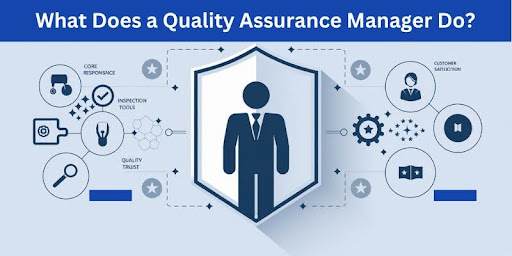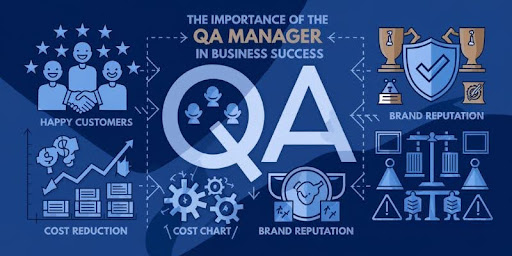What Does a Quality Assurance Manager Do? | Role, Responsibilities, and Importance
The term Quality Assurance refers to the systematic process of ensuring that a product or service meets the quality standards set by an organization. When a product falls short of the required quality standards, it is the QA Manager’s responsibility to prevent it from reaching the customer. By supervising rigorous testing, inspections, and quality control measures, the QA Manager ensures that only products that meet the highest standards make it to the market. This not only safeguards the organization’s reputation but also ensures customer satisfaction and trust. In essence, the QA Manager acts as the gatekeeper, ensuring that substandard products are kept away from customers and that the brand maintains its credibility and reliability.

In this blog, we will explore the responsibilities, skills, and impact of a Quality Assurance Manager, highlighting the importance of this role in both the product development process and overall organizational success.
What is a Quality Assurance Manager?
A Quality Assurance Manager is a professional who oversees and ensures that an organization’s products, services, or processes meet established standards of quality before they reach customers or clients. The QA Manager’s role encompasses planning, developing, implementing, and managing quality assurance processes that focus on improving the quality, performance, and safety of products and services.
In short, a QA Manager’s job is to prevent defects, ensure compliance with standards, and improve overall product and service quality. This role is critical in industries like manufacturing, software development, healthcare, and service-oriented businesses, where the cost of poor quality can be significant both financially and reputationally.
Key Responsibilities of a Quality Assurance Manager
The responsibilities of a QA Manager can vary depending on the industry and specific company needs, but some core tasks are consistent across most sectors.
- Developing Quality Standards and Policies A QA Manager is responsible for developing and implementing quality standards that align with industry regulations, customer expectations, and company goals. These standards serve as the framework within which all products or services must operate. The manager works closely with product designers, developers, and engineers to ensure that these standards are realistic, measurable, and achievable.
-
Creating and Implementing Quality Control Processes
One of the main duties of a QA Manager is to develop effective quality control (QC) processes to ensure consistency and reliability in production. This could involve setting up automated testing protocols, inspection guidelines, or auditing procedures to assess quality at various stages of the production or service delivery process.
For example, in software development, the QA Manager will set up testing phases (unit testing, integration testing, user acceptance testing) to identify bugs or performance issues before the product reaches the customer. - Managing a Team of QA Professionals The QA Manager typically leads a team of quality assurance testers, inspectors, and other professionals. They are responsible for hiring, training, and mentoring QA staff, ensuring they have the necessary skills and tools to perform their tasks. This involves regular performance reviews, setting clear expectations, and fostering an environment of continuous improvement within the team.
- Overseeing Product Testing and Inspections A significant aspect of the QA Manager’s job is to monitor the testing and inspection processes. They ensure that all products or services go through rigorous testing and meet the required quality criteria before being released to customers. In industries like manufacturing, this could include overseeing physical inspections of goods, while in software development, it may involve managing the bug-tracking and testing stages. Must see: Quality Assurance Testing: Proven Methods and Best Practices for Software Excellence
- Identifying and Resolving Quality Issues A critical function of the QA Manager is identifying areas where quality can be improved, whether that’s through analyzing customer feedback, conducting internal audits, or reviewing performance data. If defects or inconsistencies are found, the QA Manager will work with other departments to investigate root causes and implement corrective actions to prevent recurrence.
- Tracking Key Performance Indicators (KPIs) QA Managers monitor key performance indicators (KPIs) to measure the effectiveness of quality assurance processes. These metrics can include defect rates, customer complaints, time to resolve issues, and product returns. By analyzing these KPIs, the QA Manager can determine if quality standards are being met and where improvements are needed.
- Continuous Improvement Quality assurance is not a one-time task; it is an ongoing process. QA Managers are always looking for ways to improve existing processes, reduce inefficiencies, and ensure that quality is consistently upheld across all operations. This can involve adopting new technologies, refining processes, or initiating employee training programs to elevate standards.
Skills Required for a Quality Assurance Manager
The role of a QA Manager demands a broad skill set that combines technical expertise with leadership abilities. Some essential skills for success in this position include:
- QA Managers must have a keen eye for detail to identify defects and inconsistencies that may go unnoticed by others.
- The ability to analyze data, recognize patterns, and derive actionable insights is crucial in identifying areas for improvement and optimizing quality assurance processes.
- QA Managers need to lead and inspire their teams, ensuring clear communication, providing support, and setting realistic goals.
- When quality issues arise, a QA Manager must be able to quickly assess the situation, identify root causes, and come up with effective solutions.
- A QA Manager needs to communicate quality standards, expectations, and feedback to various stakeholders, including teams, managers, and external partners.
- Managing multiple quality assurance initiatives and deadlines requires strong project management skills to prioritize tasks and allocate resources efficiently.
- A deep understanding of the specific industry and its regulatory environment is essential for ensuring compliance and implementing best practices.
The Importance of the QA Manager in Business Success

The impact of a QA Manager extends far beyond the technical aspects of ensuring quality. Here are a few ways in which their role contributes to overall business success:
- Customer Satisfaction and Retention By ensuring high-quality products and services, the QA Manager plays a direct role in maintaining customer satisfaction. When customers consistently receive products that meet their expectations, they are more likely to return and recommend the company to others.
- Cost Reduction A proactive QA Manager helps identify and resolve potential issues before they become major problems, reducing costly recalls, warranty claims, or customer dissatisfaction. Preventing defects at the early stages of production is often far less expensive than fixing issues after products have been released.
- Brand Reputation Consistent quality is a key factor in building and maintaining a strong brand reputation. Companies known for producing reliable, defect-free products are often trusted more by customers, which translates to increased loyalty and market share.
- Compliance and Risk Management Quality assurance ensures that an organization complies with both internal and external regulations, reducing the risk of legal issues or penalties. It also helps mitigate operational risks associated with poor quality or product failures.
Quality Assurance Services at AMREP Mexico
Quality Assurance Manager is integral to ensuring that a company's products and services meet the highest standards of quality before they reach the customer. QA Managers protect both the company’s reputation and its customers’ trust.
At AMREP Mexico, our commitment to quality is central to our operations, and the role of our QA Manager is essential in upholding these standards. By maintaining a rigorous focus on quality at every stage, AMREP Mexico continues to deliver products that meet—and exceed—the expectations of our clients and partners. If you're interested in hiring quality engineers in Mexico, we can provide top-tier professionals who are dedicated to upholding the highest quality standards in every aspect of our operations.
Feel free to reach out if you want to learn more about how AMREP Mexico integrates quality assurance into our processes or how we can help your business achieve higher quality standards. Quality is our promise, and we’re here to help you achieve it.


